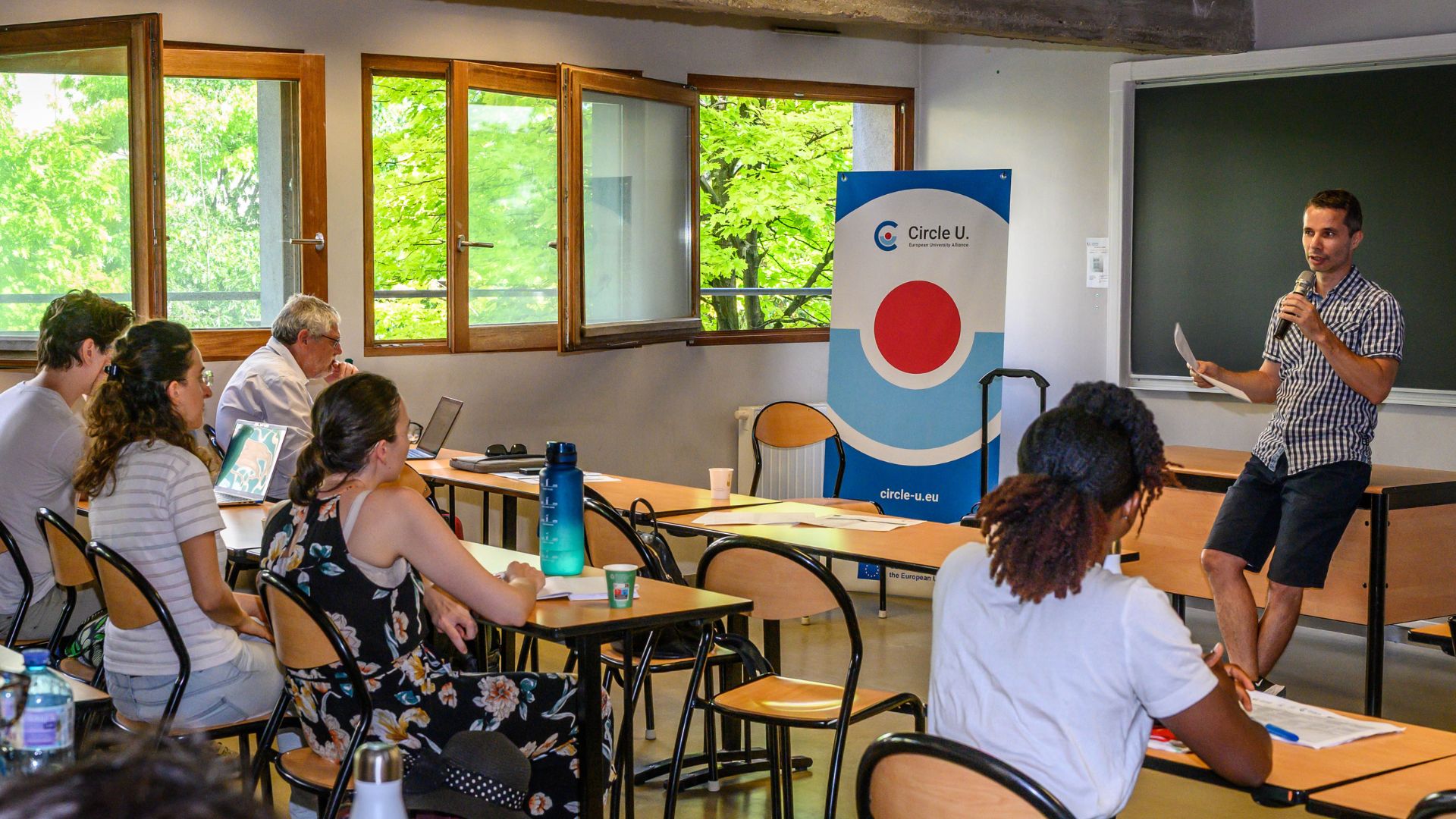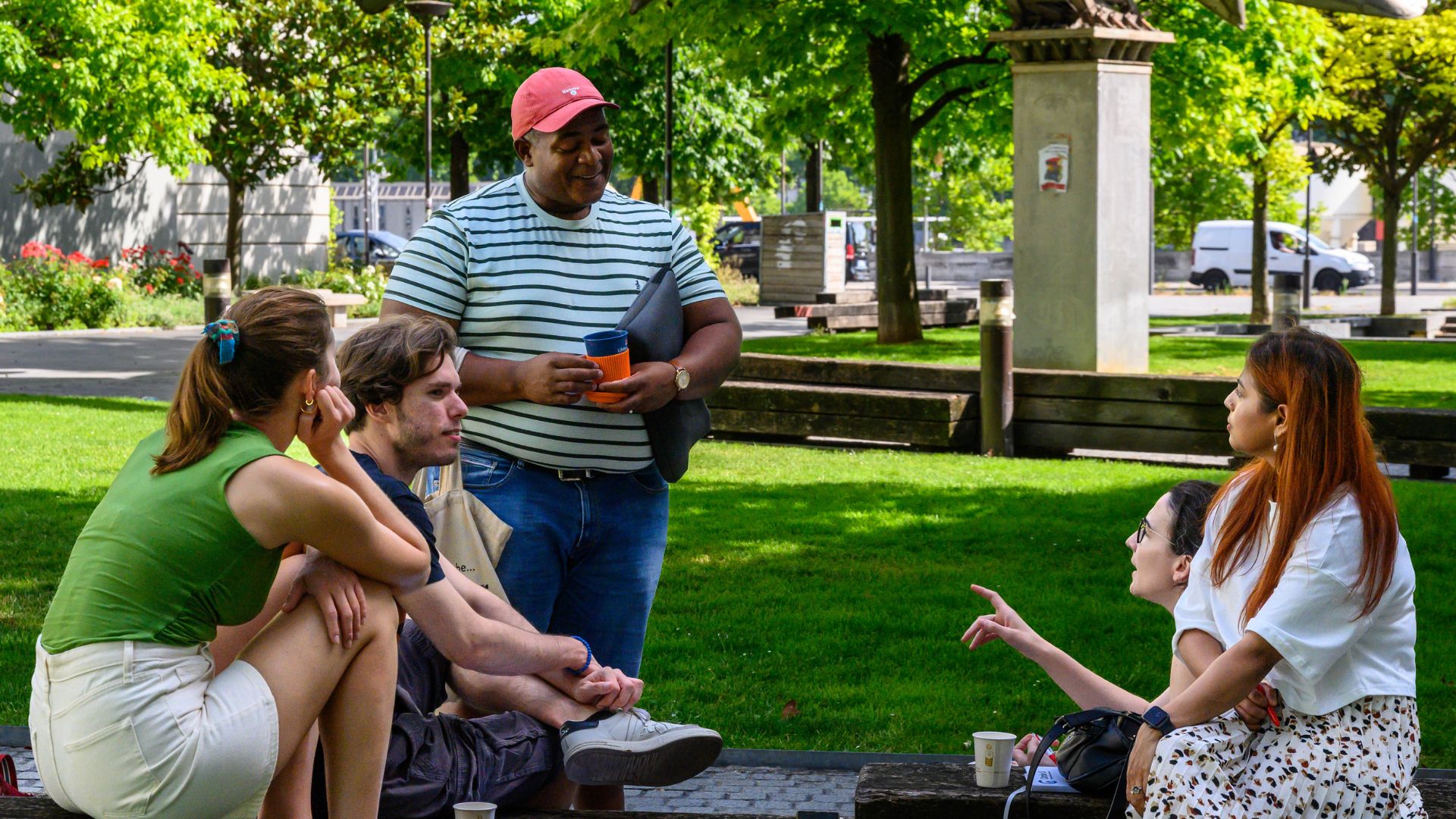Durée
82 heures / 82 hours
Faculté
Faculté de Santé
Langue des enseignements
Français, Anglais
Présentation
Référence formation (à rappeler dans toute correspondance) : DUC781
Responsable(s) pédagogique : Pr Grégory Katz
Forme de l'enseignement : Présentiel + distanciel synchrone* et asynchrone*
*En visio-conférence, en direct
**La formation à distance asynchrone se déroule de manière flexible. Elle permet d'apprendre à son propre rythme, en accédant aux contenus des cours, sans présence simultanée avec les enseignants et les autres participants. Suivre une formation à distance de manière asynchrone nécessite d’être autonome et de garder une motivation personnelle forte pour avancer dans le cursus.
Pour vous inscrire, déposez votre candidature sur C@nditOnLine
Objectifs
La mesure du résultat des soins par le patient (Patient-Reported Outcome Measurements, PROMs) peut transformer les systèmes de santé, en permettant aux soignants de se comparer pour s’améliorer au sein de communautés de pratiques.
Cette dynamique collective d’amélioration continue redonne du sens aux équipes soignantes en les aidant à se recentrer sur les actes pertinents pour transformer les parcours de soins.
La mise en œuvre des PROMs et des données cliniques (CROMs) requiert une démarche standardisée, digitalisée, ajustée aux profils des patients, valorisant l’intégrité de la donnée. Au-delà des soins courants, les PROMs ouvrent aussi une nouvelle génération d’études cliniques, et d’achats hospitaliers centrés sur la valeur du résultat patient en vie réelle.
Objectifs :
Le Diplôme Universitaire Valeur et Pertinence des Soins (Value-Based Health Care, VBHC) répond à ces défis opérationnels :
- Construire un référentiel d’indicateurs résultats-coûts en vie réelle
- Mobiliser une gouvernance scientifique impliquant les patients et les professionnels
- Renforcer l’intégrité de la donnée, l’analyse statistique et la prévention des biais
- Créer une communauté de pratique et une dynamique d’amélioration continue
- Mettre en œuvre des incitatifs économiques et non économiques
- Adopter une stratégie de digitalisation de la collecte des données
- Bâtir des partenariats fondés sur la valeur des soins en vie réelle
- Développer son leadership pour la conduite du changement
Compétences visées
A l’issue de la formation, le participant est capable de :
- Construire un plan de mise en œuvre de la démarche Value-Based Health Care
- Utiliser des outils et méthodes pour déployer concrètement ce plan
- D’améliorer son leadership pour conduire le changement
Programme
Référence formation : DUC781
Volume horaire : 82 heures
- Sessions en présentiel : 45 heures (le vendredi et le samedi)
- Atelier distanciel : 4 heures (le vendredi)
- Sessions en distanciel asynchrone (vidéo) : 20 heures (flexible)
- Temps autonome de préparation des études de cas : 13 heures (flexible)
Calendrier : Du 06/11/2025 au 14/03/2026
Rythme : : Le présentiel-distanciel est compatible avec une activité professionnelle. Les 5 mois de formation s’organisent sur 4 jours ouvrés (un jeudi, et deux vendredis) ainsi que 2 samedis. Le format flexible du programme permet à chaque participant d’organiser librement son temps entre les sessions distanciels, vidéos asynchrones et les temps autonomes de préparation des études de cas.
Lieu : Nantes, Paris, en ligne.
CONTENUS PÉDAGOGIQUES
Module 1 – Mesurer la valeur des soins
(Présentiel, Nantes : jeudi 6 et vendredi 7 novembre 2025)
- Principes fondateurs de la valeur en santé (Value-Based Health Care, VBHC)
- Présentation des concepts, instruments et méthodes de mise en œuvre
- Etude de cas, visite sur site d’équipes pionnières
- Évaluation : discussion collective sur les études de cas, questions QCM
Module 2 – Comparer la valeur des soins
(Distanciel asynchrone, et atelier distanciel le vendredi 12 décembre 2025 de 15h00 à 17h00)
- Gouvernance scientifique impliquant professionnels et patients
- Validation d’indicateurs PROMs, CROMs, PREMs, avec profils de sévérités des patients
- Modèles de comparaisons ouvertes entre équipes
- Évaluation : discussion collective sur les études de cas, questions QCM
Module 3 – Améliorer la valeur des soins
(Présentiel, Paris : vendredi 16 et samedi 17 janvier 2025)
- Organisation de la communauté de pratiques et des cycles d’amélioration continue
- Registres de résultats et dynamique d’intelligence collective
- Impact coût-efficacité pour les établissements et le système de santé
- Évaluation : discussion collective sur les études de cas, questions QCM
Module 4 – Mise en œuvre de la valeur des soins
(Distanciel asynchrone et atelier en ligne le vendredi 20 février 2026 de 15h00 à 17h00)
- Leadership, alignement des parties prenantes
- Gestion de projets et conduite du changement
- Digitalisation de la collecte des données PROMs, CROMs et PREMs
- Évaluation : discussions collective sur les études de cas, questions QCM
Module 5 – Incitatifs et valorisations
(Présentiel, Paris : vendredi 13 et samedi 14 mars 2026)
- Soutenance des posters par les participants
- Rémunération selon la valeur des soins et achats hospitaliers en Europe
- Valoriser le résultat patient et redonner du sens aux soignants
- Évaluation : soutenance orale devant jury
MOYENS PÉDAGOGIQUES ET TECHNIQUES D’ENCADREMENT
Équipe pédagogique
Responsable pédagogique : Pr. Gregory Katz est titulaire de la Chaire Valeur et Pertinence des Soins à l'Université Paris Cité et directeur académique du D.U. Valeur et Pertinence des Soins. Membre de l'Académie française de chirurgie, il est également président de PromTime.
Coordinateur pédagogique : Raquel Correia est médecin généraliste, titulaire d’un MBA et d’un master en sciences de l’éducation.
Ressources matérielles
Afin de favoriser une démarche interactive et collaborative, la plateforme Moodle sera proposée pour permettre :
- d'échanger des fichiers, des données
- de partager des ressources, des informations
- de communiquer simplement en dehors de la salle de cours et des temps dédiés à la formation.
MOYENS PERMETTANT DE SUIVRE L’EXÉCUTION DE LA FORMATION ET D’EN APPRÉCIER LES RÉSULTATS
- Au cours de la formation, le stagiaire émarge une feuille de présence par demi-journée de formation en présentiel.
- Distanciel asynchrone > la réalisation de la formation est attestée par le scénario pédagogique, les relevés techniques de votre activité à distance ainsi que les travaux réalisés.
- Distanciel synchrone > la réalisation de la formation est attestée par le relevé de connexion de la plateforme de visio-conférence ou la signature électronique de la feuille d’émargement, ainsi que par le scénario pédagogique et les travaux réalisés.
Contrôle des connaissances
Modalités de contrôle des connaissances et des compétences :
Le Diplôme Universitaire Valeur et Pertinence des Soins est délivré à l’issue d’un processus d’évaluation des connaissances et de l’engagement et chaque participant tout au long du programme. Le processus comprend :
- Cinq évaluations courtes des connaissances acquises à partir de questionnaires à choix multiples (10’ par évaluation)
- La participation individuelle à l’analyse des études de cas avec les intervenants et les autres participants tout au long du programme ;
- Une soutenance individuelle d’un poster devant un jury détaillant la mise en œuvre d’un projet VBHC au sein de l’organisation dans laquelle travaille le participant
Modalités de validation du diplôme :
- QCM = 30%
- Participation = 40%
- Soutenance devant un jury = 30%
Tutorat
Un accompagnement pédagogique réactif est proposé tout au long de la formation. Pour faciliter le contact avec votre référent, Raquel Corréia, vous pourrez poser vos questions par le biais du forum de discussion Moodle, par échanges de mails, ou lors des visioconférences.
Aménagements particuliers
Admission
Public cible
- Professionnels de santé (y compris les internes)
- Responsables au sein d’établissements de santé
- Responsables d’autorités de santé
- Responsables d’organismes payeurs
- Responsables dans les entreprises des produits de santé
- Chercheurs (y compris doctorants)
- Entrepreneurs en santé digitale
- Responsables dans monde associatif
- Personnes en transition professionnelle
Conditions d'admission
L'entrée en formation nécessite un avis pédagogique. Vous déposerez dans C@nditOnLine :
- votre Curriculum Vitae
- votre lettre de motivation pour participer à la formation
- vos diplômes vous permettant de justifier l'accès à la formation
Pré-requis
Aucun prérequis nécessaire hormis les diplômes liés aux titres que doivent détenir les futurs inscrits (cf. personnes autorisées à s'inscrire dans la rubrique "Conditions d’admission").
Attendus
Le participant doit être équipé d’un ordinateur et avoir une bonne connexion internet.
Les clefs de la réussite
Des fiches pratiques sont à votre disposition sur la page http://www.reussir-en-universite.fr/index.html
Modalités de candidature
Référence formation : DUC781
1. Créer et activer votre compte utilisateur sur la plateforme C@nditOnLine (accessible grâce aux navigateurs Chrome ou Mozilla)
2. Compléter attentivement vos informations personnelles et déposer obligatoirement tous les documents justificatifs, uniquement au format PDF, à savoir :
- La copie recto-verso de votre pièce d'identité en cours de validité (carte nationale d'identité ou passeport)
- Le diplôme d'Etat justifiant le niveau d'accès à la formation souhaitée
- Pour les étrangers hors Union Européenne : joindre en complément la copie recto-verso du titre de séjour ou récépissé ou visa en cours de validité
3. Cliquer sur "Mes candidatures" puis sur "Nouvelle candidature"
4. Sélectionner le domaine de rattachement (UFR/Composante), le type et l'intitulé de la formation souhaitée. Préciser le mode de financement.
5. Télécharger votre CV et votre lettre de motivation pour chaque formation souhaitée.
À joindre en complément dans C@nditOnLine :
- si vous êtes étudiant en LMD, interne, ou faisant fonction d'interne inscrit dans une université : votre certificat de scolarité universitaire justifiant de votre inscription pour l'année universitaire en cours à un Diplôme National ou un Diplôme d'Etat (hors DU-DIU)
- si vous bénéficiez d'une prise en charge : votre accord de prise en charge
TOUT DOSSIER INCOMPLET NE POURRA PAS ÊTRE TRAITÉ.
ATTENTION : POUR LES DEMANDEURS D'EMPLOI, préciser dans votre dossier C@nditOnLine, votre numéro de demandeur d'emploi, votre agence de rattachement et sélectionner le mode de financement Pôle emploi au moment de la candidature.
POSTULER A LA FORMATION en vous connectant à la plateforme C@nditOnLine (lien cliquable)
Droits de scolarité
FRAIS DE FORMATION* selon votre profil
- Pour toute personne bénéficiant d’une prise en charge totale ou partielle (hors Pôle emploi) : 2500 €
- Pour toute personne finançant seule sa formation : 2500 €
- Pour toute personne finançant seule sa formation et diplômée de moins de 2 ans d’un DN/DE (hors DU-DIU) OU justifiant pour l’année en cours d’un statut d’AHU OU de CCA OU de FFI hospitalier OU de paramédicaux ou représentants de patients, PhD: 1500 € (justificatif à déposer dans CanditOnLine)
- Pour toute personne finançant seule sa formation et étant étudiant, interne, doctorants ou Faisant Fonction d'Interne universitaire : 1500 € (certificat de scolarité universitaire justifiant votre inscription en Formation Initiale pour l’année universitaire en cours à un Diplôme National ou un Diplôme d’État - hors DU-DIU - à déposer dans CanditOnLine)
- Tarif réduit spécifique (2500 €) : pour les membres d’associations à but non lucratif
FRAIS DE DOSSIER* : 300 € (à noter : si vous êtes déjà inscrit(e) dans un Diplôme National à Université Paris Cité sur la même année universitaire, vous êtes exonéré(e) des frais de dossier – certificat de scolarité à déposer dans CanditOnLine).
*Les tarifs des frais de formation et des frais de dossier sont sous réserve de modification par les instances de l’Université.
Cliquez ici pour lire les Conditions Générales de vente / Outils de l’adulte en Formation Continue / Documents institutionnels / CGV hors VAE
Et après ?
Poursuites d'études
Vous pouvez toujours compléter ou acquérir de nouvelles compétences en vous inscrivant à d'autres diplômes d'université, des formations qualifiantes ou des séminaires.
Débouchés professionnels
- Au sein de l’industriel : affaires médicales, affaires publiques, market access
- Au sein des établissements de santé : direction d’établissements, direction qualité, achats, R&D
- Au sein d’autorités de santé : direction médicales, études, qualité, appuis à la performance
- Au sein d’organismes payeurs publics : directions de la qualité, des études, de l’appui à la performance
- Au sein des assurances en santé : directions de l’innovation, études, qualité
- Au sein des associations d’usagers du système de santé : directions médicales, affaires publiques
- Au sein d’organismes scientifiques : directions de la recherche
Contacts
Grégory Katz
Responsable pédagogique
Dernière mise à jour le 20 octobre 2025
A lire aussi
À l’occasion de la Semaine nationale des Cordées de la réussite 2026, l’Université Paris Cité réaffirme son engagement en faveur de la démocratisation de l’accès à l’enseignement supérieur à travers des actions concrètes, innovantes et ancrées dans les territoires.
Étudiantes et étudiants de l’Université Paris Cité, nous vous donnons rendez-vous le jeudi 19 mars 2026 pour la 2ᵉ édition de cet événement annuel dédié à l’emploi, aux stages et à l’alternance. Près de 30 recruteurs seront présents pour vous proposer des opportunités concrètes et des conseils personnalisés afin de faciliter votre insertion professionnelle. Nouveauté cette année : le Forum des métiers de la transition écologique et de la solidarité vous invitera à réfléchir aux enjeux de l’engagement écologique et solidaire dans le monde du travail au travers de conférence, ateliers et tables rondes.
Vous étudiez à l’Université Paris Cité et vous souhaitez profiter de vos vacances d’été pour renforcer votre CV tout en découvrant un nouveau pays ? Notre université est membre de l’alliance européenne Circle U. et vous permet, à travers son campus ouvert, de candidater gratuitement aux écoles d’été organisées chaque année. Plusieurs thématiques transverses sont abordées comme la Santé Globale, le Climat, la Démocratie ou le Multilinguisme par exemple. Les candidatures sont ouvertes jusqu’au 28 février, renseignez-vous !
Vous êtes doctorant ou doctorante à l’Université Paris Cité et vous souhaitez étendre votre réseau et vos connaissances en Santé Globale ? L’alliance européenne Circle U. vous invite à participer à la nouvelle édition de son école d’été « New avenues for Global Health » qui aura lieu du 6 au 11 juillet 2026 dans les locaux de notre université ! Les candidatures sont acceptées jusqu’au 28 février.






